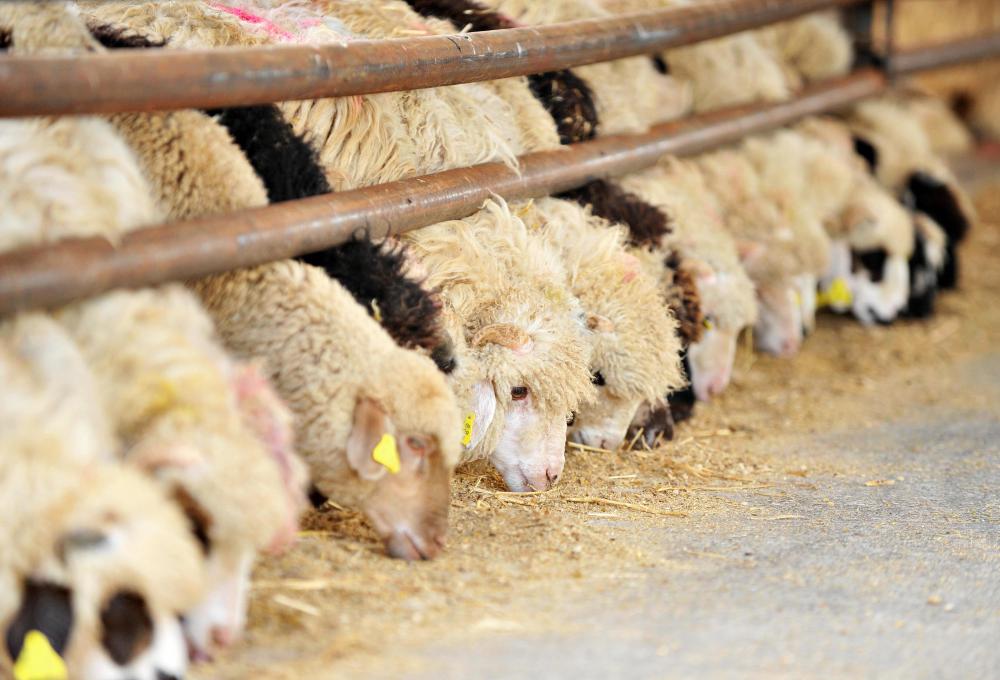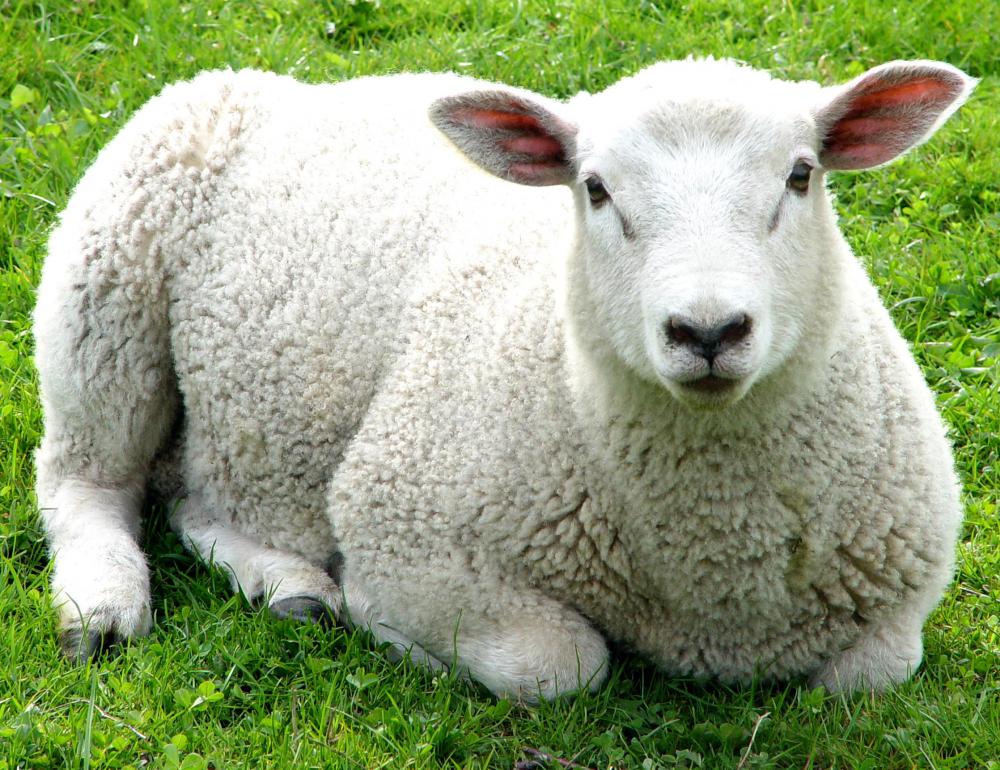At AllThingsNature, we're committed to delivering accurate, trustworthy information. Our expert-authored content is rigorously fact-checked and sourced from credible authorities. Discover how we uphold the highest standards in providing you with reliable knowledge.
What are the Basics of Sheep Farming?
One of the most basic decisions involved in sheep farming is choosing what purpose will be served by tending the sheep. Many farmers raise sheep to slaughter for their meat or shear for their wool, while others breed or raise sheep to sell them. Another form of sheep farming involves raising dairy sheep for milking. Caring for show sheep and breeding purebreds also are common practices. Additionally, some enthusiasts raise pet sheep as a hobby.
There are many sheep breeds, and identifying which types of sheep to buy is an important part of sheep farming. Certain types of sheep are suitable for meat production, whereas others are prized more for the quality of their wool. Other varieties of sheep, such as certain classes of purebred, are appropriate choices for breeding. Geographical location may play a role in determining what kind of sheep to select, because some breeds are more common in particular parts of the world.

Proper nourishment and a fresh water supply are fundamental concerns in any type of animal farming. Sheep graze naturally and are commonly given access to a portion of grassy land, often referred to as a pasture. The amount of land needed to adequately support nutritional requirements depends on the number of sheep, because a large herd requires more pasture land than a small flock. Commercial sheep farming typically involves the use of an abundant tract of land for the sheep to roam and graze. Small-scale sheep farms utilize a more modest area of land, sometimes used in conjunction with grain or hay for supplemental feeding.

Shelter is another basic consideration for those who raise domestic animals. If sheep farming takes place in a cold climate, the animals may require a structure to protect them, whereas shelter may not be a necessity in areas where the temperature is moderate all year. Sheep may need shelter from the environment before shearing to ensure its wool is dry for the process and after shearing to protect it from the elements.

For any type of sheep farming, maintaining a healthy flock is of the utmost importance. Sheep of any age and breed are susceptible to a wide range of illnesses and health problems. Farmers or veterinarians often give sheep vaccinations when they are young to help stave off diseases. When compared to mature sheep, lambs are more prone to certain illnesses and often require special attention to maintain their health. Consultation with a veterinarian can help sheep farmers prevent and cure sheep diseases.

Sheep farming also involves flock safety, because both mature sheep and young lambs are at risk from predators. Utilizing a guard dog or human overseer, also called a shepherd, may protect sheep from natural dangers and maintain safety. Farmers may also choose to use a shelter to protect the sheep from predators during the night.
Frequently Asked Questions
What are the primary considerations when starting a sheep farm?

Starting a sheep farm requires understanding the breed's specific needs, including diet, shelter, and space. Sheep require good quality pasture for grazing, protection from predators, and a clean water supply. It's also essential to consider the climate, as sheep can be sensitive to extreme temperatures. Regular veterinary care is crucial to manage health issues like parasites and foot rot.
How much land do you need for sheep farming?

The amount of land needed for sheep farming depends on the pasture quality and the breed of sheep. Generally, an acre of pasture can support four to six sheep. However, this can vary widely based on local conditions and farm management practices. Rotational grazing can optimize land use and maintain pasture health, according to the University of Minnesota Extension.
What is the best breed of sheep for farming?

The best breed of sheep for farming depends on your goals: meat, wool, or milk production. For meat, breeds like Suffolk and Dorper are popular. Merino sheep are renowned for their high-quality wool, while East Friesian sheep are excellent for milk production. Local climate and market demand should also influence breed selection, as noted by the American Sheep Industry Association.
How do you ensure the health and welfare of sheep?
Ensuring the health and welfare of sheep involves providing a balanced diet, clean water, and regular health checks. Vaccinations and parasite control are vital, as is prompt treatment of any illnesses or injuries. Adequate shelter and stress reduction are also important. The Five Freedoms of Animal Welfare should guide all husbandry practices to ensure sheep well-being.
What are the key challenges in sheep farming?
Key challenges in sheep farming include managing diseases like scrapie and foot-and-mouth disease, controlling internal and external parasites, and protecting the flock from predators. Market fluctuations can also impact profitability. Additionally, labor can be intensive, especially during lambing season. Access to veterinary services and adapting to environmental changes are ongoing concerns for sheep farmers.
How profitable is sheep farming?
Sheep farming profitability varies based on factors like feed costs, market prices, and farm efficiency. Diversifying products, such as selling meat, wool, and even agritourism, can increase revenue streams. According to the National Sheep Association in the UK, careful management and marketing strategies are key to enhancing profitability in the sheep industry.
AS FEATURED ON:
AS FEATURED ON:

















Discussion Comments
My grandfather raised sheep for the wool. Raising the sheep was something he and my grandmother took on after my grandfather retired. They liked the animals and thought caring for them would be fun and a good way to remain active as they aged.
The new hobby/occupation proved to be great for my grandparents. They loved the animals and they met other people who were in the sheep business as well. Each year the sheep farmers would host workers from Australia who came to the U.S. to shear sheep. The workers would work at all the sheep farms in the area and then move across the country working at other farms and earning money as they went. For the workers, this was an annual trek.
This article talks about the need to protect sheep from predators. I have a friend who raises sheep and when he first began raising the animals he was during well with them until he began to lose animals to predators who found the sheep to be easy prey. Sheep are not aggressive and they were confined in a fence, so there was only so far they could run to escape.
Coyotes and dogs were the culprits killing my friend's sheep. He couldn't watch the animals all day and night and he didn't want to have to lock them in barns or other shelters to protect them, so he added donkeys to the herds. The donkeys naturally protect the other animals in the herd against predators.
Donkeys seem to have a particular dislike for coyotes, and will usually scare the animals off without a fight, but in a confrontation, a donkey can easily kick and kill a coyote, or a dog for that matter. Donkeys are good protection for a variety of livestock.
Post your comments